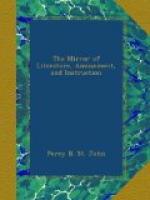in a poorer must have been highly offensive to the
frugality and jealousies of a republic. The religious
orders, the Capucins particularly, are in constant
requisition; not a day that you may not meet two or
three of their detachments in various parts of the
city:—–the religious or charitable
fraternities, such as the Fratelli della Misericordia,
of which the deceased is generally a brother or a
benefactor, or both, think it also a point of duty
and gratitude to swell the
cortege, and in
the greatest numbers they can muster to attend.
Their costume, which is highly picturesque, is always
a striking feature, and adds much to the brilliancy
of the display. They wear a sort of sack robe
or tunic, which covers the whole body, girt with a
rope round the waist, and with holes pierced in the
capuchon for the eyes; their large grey slouched
hat is thrown back, much in the manner in which it
appears on the statues of Mercury, on their shoulders;
their feet are often in zoccoli, or sandals of wood,
and sometimes, though rarely, bare. The colour
of their dress varies according to the rule of their
society; at Rome, I have noticed white, blue, and
grey: at Florence they prefer black. The
corpse is dressed up with great care, and often with
a degree of luxury which would become a wedding; the
best linen, the richest ornaments, are lavished; garlands
are placed on the head; the hands crossed, with a
crucifix between them, on the bosom, and the face and
feet left quite bare. Sometimes, through a capricious
fit of piety, all this is studiously dispensed with,
and the body appears clad in the habit of some religious
order, to which the deceased was especially addicted
during life. In this manner the procession begins
to move after sunset, preceded by a tall silver cross,
beadles, &c.; friars, priests, &c. chanting the De
Profundis through the principal streets to the church
where it is intended it should be interred.
The effect, with some abatements for boys following
to pick up the drippings of the torches, and the perfect
indifference of the assistants, for neither friends
nor relatives attend, is certainly very solemn.
The deep hoarse recitative of the psalm, the strange
phantom-like appearance of the fraternities, the flash
and glare of the torches which they carry, on the
face of the dead; the dead body itself, in all the
appalling nakedness of mortality, but still mocked
with the tawdry images of this world, in the flowers
and tinsel and gilding which surround it; the quick
swinging motion with which it is hurried along, and
with which it comes trenching, when one least expects
it, on all the gaieties and busy interests of existence
(for at this hour the Corso and the Caffes are most
crowded)—all this, without any reference
to the intrinsic solemnity of such a scene, is calculated,
as mere stage effect, powerfully to stir up the sympathies
and imagination of a stranger. On the inhabitants,
as might be apprehended, such pageants have long since




